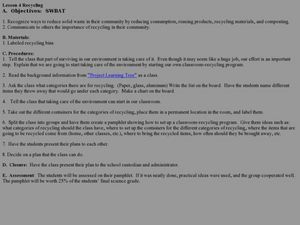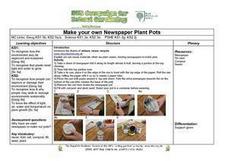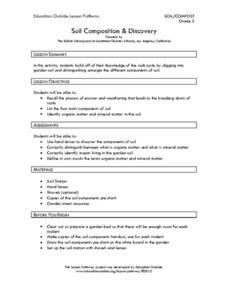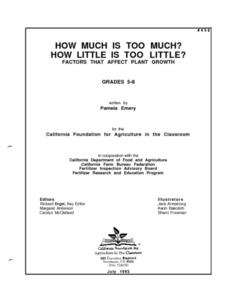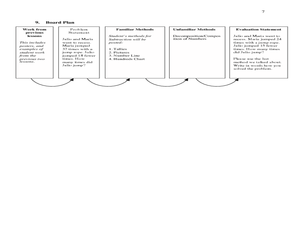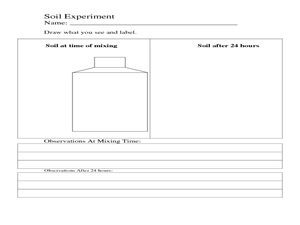Curated OER
Worms: Nature's Recyclers
Students explore vermi-composting. In this vermi-composting lesson, students listen to the story Diary of a Worm and discuss the parts of a worm. They create worm bins and add organic food for the worms to recycle.
Curated OER
Can Worms See?
Second graders discuss the previously created worm compost and the importance of living creatures to the Environment. In this worm lesson, 2nd graders observe worms and record their sensitivity to light. Students design a petri...
Curated OER
Recycling: lesson 4
Students create plans in order to reduce solid waste. For this recycling lesson plan, students discuss and come up with plans to reduce consumption, reusing products, recycling materials, and composting and then present their plans to...
Curated OER
Make Your Own Newspaper Plant Pots
Students make plant pots out of newspaper as part of a recycle, reuse, and reduce lesson. In this recycling lesson, students fold a piece of newspaper to make a pot in which to start plants. They fill it with compost and plant seeds.
Curated OER
Organic and Inorganic Recycling
Students examine their role in polluting the environment and discuss the importance of recycling. In groups, they place earthworms into compost piles to observe why they are considered natural recyclers. They also practice sorting a...
Curated OER
Willie the Worm
Young scholars explore Earth science by participating in a compost activity in class. In this worm lesson, students discuss the importance of worms in the creation of plants. Young scholars cut out pieces from a print out to assemble a...
Education Outside
Soil Composition & Discovery
Organic or mineral? How does the matter matter? Second graders use their knowledge of the rock cycle to label the different components in garden soil.
Curated OER
Illegal Dumping
Pupils go on an outing and note garbage near picnic tables. They brainstorm ways to be involved with anti-litter campaigns and write letters to local officials.
Curated OER
How Much Is Too Much? How Little Is Too Little?
Students perform a series of experiments which show that plants require nutrients in certain quantities. They also cooperatively read materials on the nutrient requirements of plants, fertilizers, composting, and soil management, and...
Curated OER
WHAT'S ORGANIC?
Students explore how certain foods come to be certified "organic." They write the words "organic" and "synthetic" and given the definitions of each. Students are given dictionaries. They are asked: "What is organic food?" Students grow...
Curated OER
Mathematics Lesson Plan
Second graders study subtraction facts. In this mathematics lesson, 2nd graders discuss how to solve two digit subtraction problems. Students recognize that there are many different methods or strategies one can use such as using...
Curated OER
All Wrapped Up
Students work in teams to identify and sort types of packaging used in food production. They consider ways to reduce the environmental impact of packaging and reflect how consumer choices play a role in trash production.
Curated OER
EcoFluxx
Students describe examples of predator/prey relationships in nature explain how some animals protect themselves from predation better follow all directions presented to them become more flexible, adaptable and literate learners. They...
Curated OER
Vermicomposting
Third graders study vermicomposting. In this vermicomposting lesson, 3rd graders prepare to begin a unit on decomposition by constructing a worm bin. Students collect worms to be used later in experiments.
Curated OER
Fan 3: Sort and Color!
Students explore the concept of recycling. In this environmental stewardship lesson, students discover how to recycle and compost. Students complete an activity that requires them to sort recyclable items.
Curated OER
Rosa Parks Community Garden
Students explore gardening and nutrition in the Rosa Parks Community Garden. They work in stations to discuss food choices, the life cycles of plants, and mini-composting. After starting in one station, they rotate to try each activity.
Curated OER
How Can We Conserve Water?
Students describe the importance of water conservation and list ways to conserve. They construct composts and fill them with materials that recycle nutrients. They inspect their homes for leaky pipes, toilets, and faucets.
Curated OER
Under Our Feet
Students investigate the forest ecosystem to learn of the living and non-living elements of the soil. For this ecosystem lesson, students examine soil for twigs, moss, fungi, leaves, roots and other matter. Students...
Curated OER
The Trash We Pass
Where does our garbage go? What is the difference between a recyclable and non-recyclable item? Pose these important, but often overlooked, questions to your class and invite them to consider the lasting and damaging effects of the...
Curated OER
Cows, Worms, and Compost
Students study decomposition. In this decomposition instructional activity, students discuss the background information about decomposition. Students then complete the 'Chew It Twice' worksheet.
Curated OER
Sarah Cynthia Sylvia Stout
Learners listen to a poem about Sarah Cynthia Sylvia Stout and how she acts and feels about garbage. As they listen, they fill in the worksheet that goes along with the poem. Both the worksheet and the poem are imbedded in this plan.
Curated OER
Vermicomposting
Fifth graders explore agriculture by viewing compost related presentations. In this worm and soil lesson, 5th graders identify the relationship between good soil and the worms who inhabit it by reading assigned text in class. Students...
Curated OER
Are You Balanced With Your Environment?
Students discuss the impact of not keeping the environment in balance for future generations. As a class, they are introduced to the concept of "Balance of Nature" and what it means. In groups, they research the role of trees and how to...
Curated OER
Soil In The Amazon
Students grow plants in soil representing that found in the Amazon basin. They compare results to plants growing in fertile soil and soil fertilized with leaf compost. Students chart, average and graph plant growth by height.
Students...
Other popular searches
- Worm Composting
- Composting Third Grade
- Trash & Recycling Composting
- Worm Compost
- Importance of Composting
- Compost Piles
- Compost Bins
- 2 Liter Bottle Composting
- Composting Temperature
- Compost Column
- Science of Composting
- Classroom Composting


